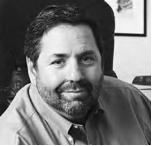Shining a Light on Three-Strikes Law
Earlier this year, the Criminal Defense Clinic launched an initiative focused on prisoners sentenced to life imprisonment under California’s threestrikes law. • “This is an area in which there has not been a focus on in-court advocacy and where in many parts of the state defendants are not getting access to appointed counsel following their direct appeals,” says Lawrence C. Marshall, David and Stephanie Mills Director of Clinical Education and associate dean for public interest and clinical education. Marshall notes that for many defendants, their “third strike” is for minor crimes like petty theft, for which the penalty of life imprisonment seems wildly disproportionate. • Thought to be the first in the nation, the Three-Strikes Project took in 12 students this past semester who worked on six cases, under close supervision by Marshall and by San Francisco defense attorney Michael Romano ’04.
One goal for the project is to present a full picture of the defendant to the sentencing judge—a common practice in death penalty cases that Marshall and Romano seek to apply in three-strikes sentencings. “In cases where a defendant is being threatened with a life sentence based on beliefs about the way in which the person led his life and the nature of the crimes he committed, there must be a meaningful investigation into the defendant’s life story and the nature of the criminal acts so the judge, who is allowed to depart from the three-strikes scheme, has adequate information,” Marshall says.

Another aim of the project is to educate the public about the law itself. “If the people of California decide that they wish to maintain the current three-strikes law—by far the harshest in the United States—that decision should be an educated one, in which voters understand the complexities of the issue and the toll that these sentences play on families and communities,” says Marshall.
The project is already seeing results. On March 19, a Santa Clara County judge rejected a proposed life sentence for one of the Criminal Defense Clinic’s clients, a transient who had failed to promptly update his sex-offender registration after becoming homeless. Carly Kaufman ’07 and Lauren Sun ’08 researched the client’s history and established his failure to register was due to mental limitations. The judge ultimately accepted the clinic’s proposed sentence—probation under the supervision of the Mental Health Court.
